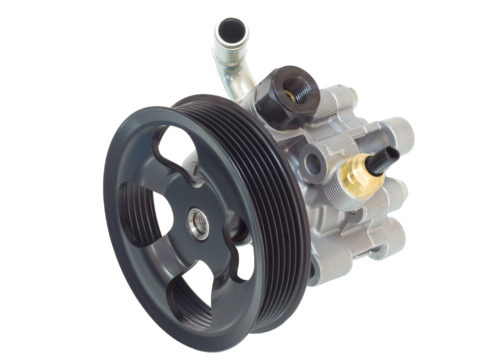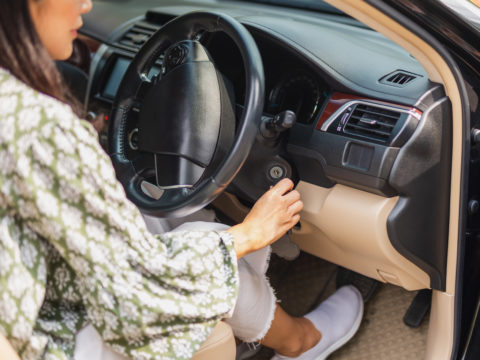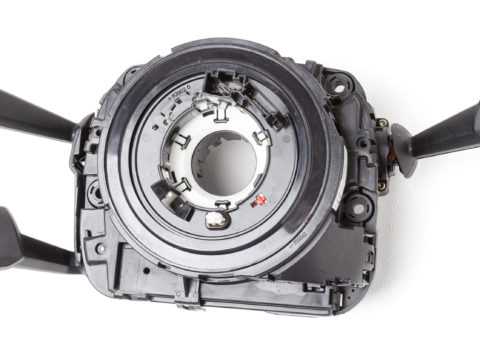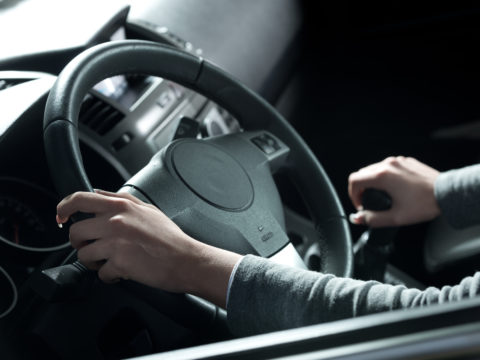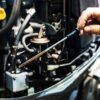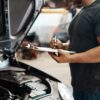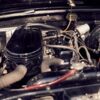It’s essential to identify different noises your steering wheel makes, as they can indicate problems with the car. In this article, we’ll discuss the most common steering wheel noises and how to fix them.
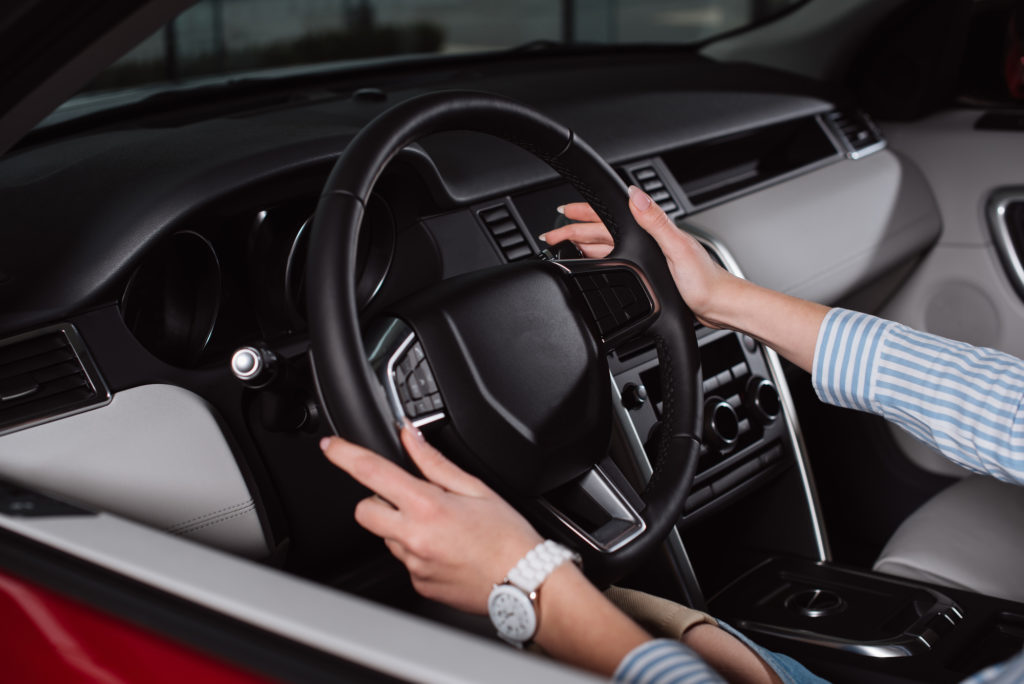
Contents
Main Causes of Steering Wheel Noise
There are several reasons why you may be hearing a noise when you turn your steering wheel. We’ll go over the most common ones below.
Bad Wheel Bearing
Your car’s steering wheel and wheels are connected by a rotary mechanism held together and turned by a bearing. You’ll hear a noise when turning the steering wheel when this goes out. This noise will likely be more noticeable when it’s cold outside.
Low Power Steering Fluid Level
Your power steering system contains fluid that should always be at the correct level so keep an eye out for any leaks. If there are any, have the system replaced as soon as possible before it causes significant problems with other components in your car.
Also, when starting your car or driving, pay attention to whether or not your steering wheel is stiffer than usual. It may be a sign that there isn’t enough fluid in the system anymore, leading to a lot of damage if left untreated.
Loose or Worn Suspension System
Your suspension system is what keeps your car level and comfortable to drive on different terrain. If any of these components are loose, worn out, or broken, you may be able to hear knocking and squeaking noises coming from the steering wheel when turning it.
Overheating Steering Rack
If there is too much heat in the steering rack, you may hear clicking and popping noises coming from your steering wheel. It usually occurs when the car has been sitting for an extended time; if you live in a hotter climate, this will happen more frequently.
Sticking Brake Caliper
If your car seems to pull towards one side when you’re driving, a stuck brake caliper may be the problem. It can also cause clicking or popping noises from the steering wheel and difficulty turning. It is often caused by corrosion in the pistons.
Loose Power Steering Hose
This hose carries power steering fluid, and if it’s loose, it could make clicking noises when you turn the steering wheel. You’ll know there’s a problem if your steering is stiffer or less responsive than usual.
Steering Wheel Noises in Different Scenarios
Steering wheel noises can occur for different reasons and in many different situations. We’ll talk about the most common ones and what solution they require below.
Noise When Turning Steering Wheel While Stationary
A loose steering wheel nut could cause a clicking noise when you make turns while your car is stationary. This is attached to the steering wheel’s centerpiece, and if it comes undone, it can cause all sorts of noises.
Possible Causes
One of the possible causes of a loose steering wheel nut could be a bad steering wheel nut or bolt. The nut and bolt that holds the steering wheel to the centerpiece may be bad. It is usually the cause if there is a clicking noise as well. Another possible cause could be bad timing.
For example, if you recently had work done on your car, it’s possible for this timing to be off, and the nut has come loose.
How to Fix It
The best way to fix this is to replace the nut with a new one. If you’re having work done on your car, go ahead and get it checked out when they do that. It should be done for free if it’s part of an overall service package.
If no loose bolts or nuts are holding the steering wheel in place, you may have a broken part in the steering wheel itself. In this case, you’ll need to replace it as soon as possible as it’s unsafe to drive with a broken steering wheel.
Noise When Turning Steering Wheel at Low Speed
A noise when turning the steering wheel while driving at low speeds can be caused by a bad power steering pump, which is part of your power steering system.
Possible Causes
One possible cause could be that there’s not enough fluid in your power steering system, and it’s causing something to scrape together. This scraping sound will cause the clicking noise.
Another possible cause is air in your power steering system, which can also lead to the same clicking noise when turning your steering wheel.
How to Fix It
To fix this problem, check your fluid levels and go ahead and add some if it’s low. If you’ve just added fluids and find it empty again soon after, this may mean there’s air in your system. You can get rid of the air by opening up the bleeder valve on the power steering pump until all the air is gone. If you don’t know how to do this, go ahead and take it to a mechanic; they will fix it for you.
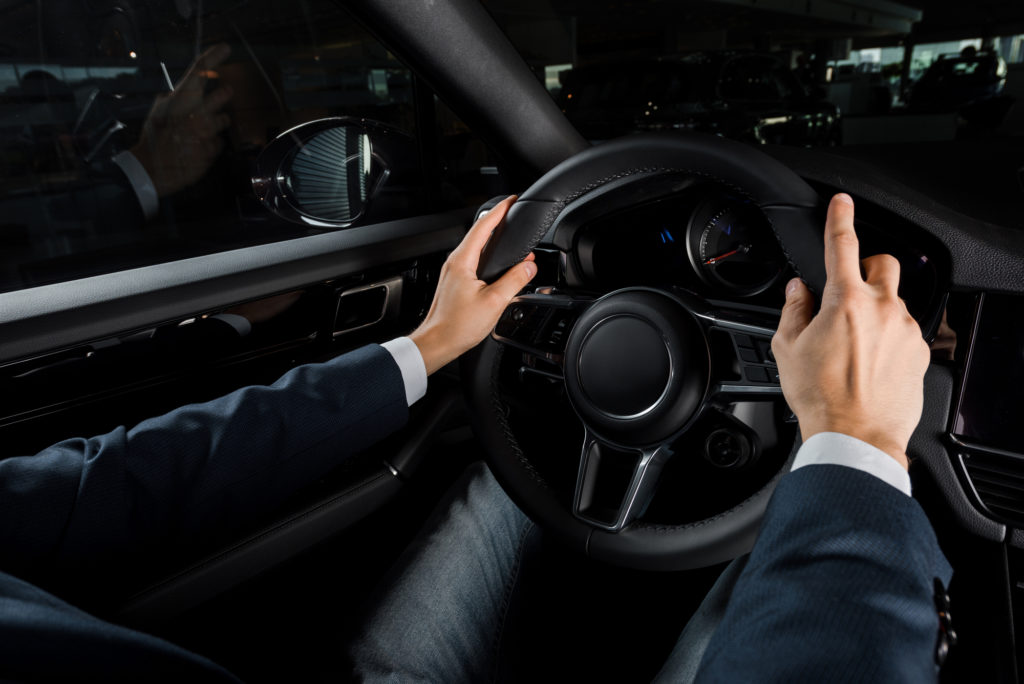
Noise When Steering Wheel Fully Turned
If you hear a clicking or popping noise when the steering wheel has fully turned in either direction, this usually means that your power steering system has gone bad. It’s no longer providing any power assistance to you while turning.
Possible Causes
One possible cause of this kind of steering wheel noise could be low fluid levels in the power steering system. In addition, it can cause friction between parts of your power steering system, which will lead to popping noise.
Another possible cause is worn bearings in the power steering rack and pinion assembly. These are located at either end of your car’s steering column, where it meets the front wheels, and if they are worn out, they will make popping sounds.
How to Fix It
The best way to fix this steering wheel noise is to have the power steering system inspected and, if needed, repaired or replaced. Replacing it can sometimes resolve your popping and clicking noises, and the stiffer feel when you turn at low speeds. The same goes for checking fluid levels and adding more if needed.
Steering Wheel Noise When Cold
If you hear a noise from your steering wheel only when the car is cold, it means that there’s moisture in your power steering fluid. It can lead to metal-on-metal contact between parts of the system and cause grinding or squeaking sounds and a stiffer feel while turning at low speeds.
Possible Causes
The possible causes of this clicking noise are usually the power steering pump or fluid reservoir. In addition, there may be rust in either one of these parts, which will cause squeaks and grinding sounds when turning your steering wheel while the car is cold.
Another possible cause could be that there’s air in your power steering system. It can also lead to not having enough pressure in your power steering system, which causes a squeaking or grinding noise when turning the steering wheel.
How to Fix It
If needed, inspect and replace or repair any faulty parts of your power steering system, such as the pump and reservoir. If you do this, it will resolve your steering wheel noise when cold and improve your power assistance when turning the steering wheel at low speeds.
In addition, if there’s air in your system, you can release the air pressure by opening up the bleeder valve on your steering pump until all the air is gone.
Single Click When Turning Steering Wheel (Steering Locking)
When turning your steering wheel, a single click is usually not a big deal. It can be caused by the power steering system’s electrical connection, which needs to be secured firmly, or it may come loose and cause that noise you hear whenever you turn the wheel.
Possible Causes
If the noise only happens once every time you turn your steering wheel, it can mean that the clip on your power steering system’s electrical connection is loose and needs to be secured appropriately.
How to Fix It
The best way to fix this noise is to secure the power steering system’s electrical connection firmly; this might require tightening one of the bolts holding it in place. This clicking or popping noise won’t cause any other problems for your power steering system, but it can indicate a loose connection.
What to Do If the Weird Noise Won’t Go Away
If the noise doesn’t go away even after taking measures to fix it, it may be time for a professional mechanic to take a look. The good news is that most of these steering wheel noises are common and can easily be fixed by having your car’s power steering system repaired or inspected.
Remember, always be on the lookout for your car’s warning signs and symptoms to avoid more severe problems in the future. If you need help figuring out what is wrong with your vehicle or want to know how to keep it running in tip-top condition, speak to a professional mechanic. They can help you maintain your car and fix any problems that may occur, so you can keep driving safely.

